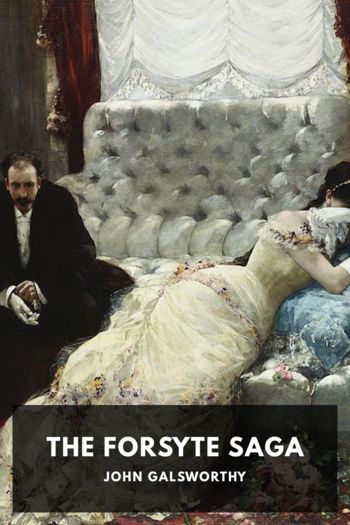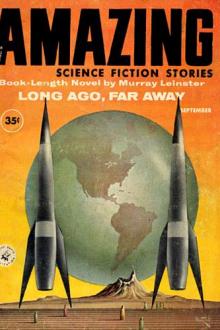The Forsyte Saga - John Galsworthy (best english novels for beginners .txt) 📗

- Author: John Galsworthy
Book online «The Forsyte Saga - John Galsworthy (best english novels for beginners .txt) 📗». Author John Galsworthy
It was over. They were easily pleased nowadays!
In the crowded street he snapped up a cab under the very nose of a stout and much younger gentleman, who had already assumed it to be his own. His route lay through Pall Mall, and at the corner, instead of going through the Green Park, the cabman turned to drive up St. James’s Street. Old Jolyon put his hand through the trap (he could not bear being taken out of his way); in turning, however, he found himself opposite the Hotch Potch, and the yearning that had been secretly with him the whole evening prevailed. He called to the driver to stop. He would go in and ask if Jo still belonged there.
He went in. The hall looked exactly as it did when he used to dine there with Jack Herring, and they had the best cook in London; and he looked round with the shrewd, straight glance that had caused him all his life to be better served than most men.
“Mr. Jolyon Forsyte still a member here?”
“Yes, sir; in the Club now, sir. What name?”
Old Jolyon was taken aback.
“His father,” he said.
And having spoken, he took his stand, back to the fireplace.
Young Jolyon, on the point of leaving the Club, had put on his hat, and was in the act of crossing the hall, as the porter met him. He was no longer young, with hair going grey, and face—a narrower replica of his father’s, with the same large drooping moustache—decidedly worn. He turned pale. This meeting was terrible after all those years, for nothing in the world was so terrible as a scene. They met and crossed hands without a word. Then, with a quaver in his voice, the father said:
“How are you, my boy?”
The son answered:
“How are you, Dad?”
Old Jolyon’s hand trembled in its thin lavender glove.
“If you’re going my way,” he said, “I can give you a lift.”
And as though in the habit of taking each other home every night they went out and stepped into the cab.
To old Jolyon it seemed that his son had grown. “More of a man altogether,” was his comment. Over the natural amiability of that son’s face had come a rather sardonic mask, as though he had found in the circumstances of his life the necessity for armour. The features were certainly those of a Forsyte, but the expression was more the introspective look of a student or philosopher. He had no doubt been obliged to look into himself a good deal in the course of those fifteen years.
To young Jolyon the first sight of his father was undoubtedly a shock—he looked so worn and old. But in the cab he seemed hardly to have changed, still having the calm look so well remembered, still being upright and keen-eyed.
“You look well, Dad.”
“Middling,” old Jolyon answered.
He was the prey of an anxiety that he found he must put into words. Having got his son back like this, he felt he must know what was his financial position.
“Jo,” he said, “I should like to hear what sort of water you’re in. I suppose you’re in debt?”
He put it this way that his son might find it easier to confess.
Young Jolyon answered in his ironical voice:
“No! I’m not in debt!”
Old Jolyon saw that he was angry, and touched his hand. He had run a risk. It was worth it, however, and Jo had never been sulky with him. They drove on, without speaking again, to Stanhope Gate. Old Jolyon invited him in, but young Jolyon shook his head.
“June’s not here,” said his father hastily: “went of today on a visit. I suppose you know that she’s engaged to be married?”
“Already?” murmured young Jolyon.
Old Jolyon stepped out, and, in paying the cab fare, for the first time in his life gave the driver a sovereign in mistake for a shilling.
Placing the coin in his mouth, the cabman whipped his horse secretly on the underneath and hurried away.
Old Jolyon turned the key softly in the lock, pushed open the door, and beckoned. His son saw him gravely hanging up his coat, with an expression on his face like that of a boy who intends to steal cherries.
The door of the dining-room was open, the gas turned low; a spirit-urn hissed on a tea-tray, and close to it a cynical looking cat had fallen asleep on the dining-table. Old Jolyon shoo’d her off at once. The incident was a relief to his feelings; he rattled his opera hat behind the animal.
“She’s got fleas,” he said, following her out of the room. Through the door in the hall leading to the basement he called “Hssst!” several times, as though assisting the cat’s departure, till by some strange coincidence the butler appeared below.
“You can go to bed, Parfitt,” said old Jolyon. “I will lock up and put out.”
When he again entered the dining-room the cat unfortunately preceded him, with her tail in the air, proclaiming that she had seen through this manouevre for suppressing





Comments (0)